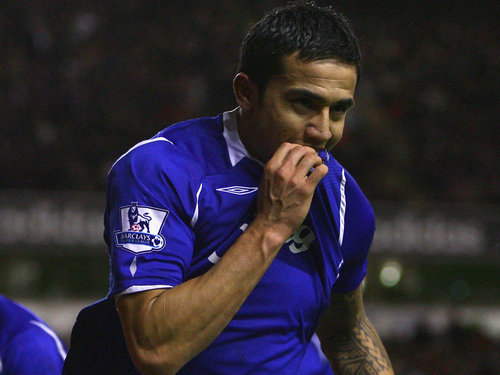Flags a quiverin’: on Cahill, and distant pride
Flags a quiverin’: on Cahill, and distant pride


By Max Grieve
I watch European football in the green glow of the television in the dark; alone, more often than not. This is so because European football is played in Europe, and Europe has been so unkind as to not invite Australia into its exclusive company. Across the seas, in a stadium rendered small by its removal from my darkened lounge room, small men play with an even smaller ball as a muted roar falls out of my speakers – and then Tim Cahill rises at the back post.
Australia is not – and this will be a shock to many of you – a nation at the centre of the footballing world. The A-League is only seven years old, and is yet to divorce itself from the shape of the other football codes. The league season ends, and a finals campaign begins. There is no relegation; rather the newspapers print a wooden spoon next to the name of the side that finishes last. Perhaps most worrying is that the season is played over the Australian summer so as to not clash with the three other major football codes. A modern era in its infancy, Australian football continues to evolve since the revolution of 2003.
The former national team coach Pim Verbeek took a dim view of the A-League (“What is wrong with it? Have you got an hour?”) and was slammed for it, but the Australian media focussed too much on the nature of his criticism, and not the criticism itself. Australian domestic football is nowhere near the European standard, and so those with greater hopes go to play in Europe, a mysterious destination spoken about in the same manner as Stoke-on-Trent’s infamous cold and windy nights.
There is a case to be made for Australia being the greatest sporting nation on earth, but its consistently broad challenge and occasional historical dominance has rarely been reflected in its international football presence. Though Australia does overachieve given its population of 22 million, there are few Australian greats, and even fewer who have earned this tag outside of the pages of the Sydney Morning Herald. Craig Johnston was the first Australian to have a major impact on the English game, but his goal for Liverpool in the 1986 FA Cup final was something of an anomaly.
Near to three decades later, Australians were ruling the Premier League. Mark Viduka was one of the best strikers in Europe as Leeds lived their paper dream, and Harry Kewell was at his zenith. Mark Schwarzer was on his way to becoming the Premier League’s longest-serving foreigner at one club with Middlesborough, and Lucas Neill, a divisive figure in England and an all-time great at home, had established himself as one of the league’s most determined defenders. Tim Cahill, meanwhile, had arrived at Everton.
Those who have challenged the world are celebrated figures in the glow of the television in the dark, as they are the next day in the newspapers. As the others have fallen away, or returned to the relative doldrums of Skilled Park and its average attendance of little over 3500, Cahill and Schwarzer have remained, and serve as sources of national pride for those who can be bothered to wake up at 2am to watch them. I have no particular feeling towards Everton, despite my supporting Liverpool, but I will explode in a silent celebration, my hands clapped across my mouth, when Tim Cahill rises to meet a cross in front of a crowded goal, then turns to perform his irritating boxing routine on the corner flag. He’s scoring for Everton, but an inescapable, irrational sense dances across my mind, and I’ll imagine that it’s a goal for those of us scattered across the country; not so much supporting a team, but a man. In a league flooded with Englishmen, I can’t imagine that an Arsenal supporter born and living in London would feel the same way if Frank Lampard scored a goal against Blackburn.
All of this has been coming to something. I’m immensely saddened by the news that Cahill will be flying across the Atlantic to live and play in New York. It signals the end of an era for Australian football, and emphasises the inexorable truth of sporting mortality. Scorer of Australia’s first World Cup goal, part of the legendary side that came within a better decision of knocking Italy out, Cahill cannot keep battering his head with balls from deep forever. His move to New York seems like an acceptance of this fact.
For those minorities, such as Australians, Americans, and Asians from across the continent, the Premier League is often removed from simple club allegiances, and replaced by national ties. As an American watching in Chicago or Seattle, supporting Clint Dempsey in the Premier League, beyond supporting Fulham, is akin to supporting an individual in the Tour de France or Wimbledon merely because they were born in the same country as you. These are not competitions in which one competes for their nation, yet we make it so.
I will miss Tim Cahill scoring against Liverpool at Goodison Park. Alas, I only receive selected matches from the MLS.







